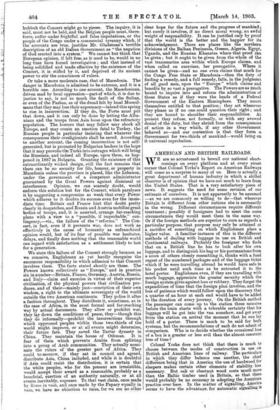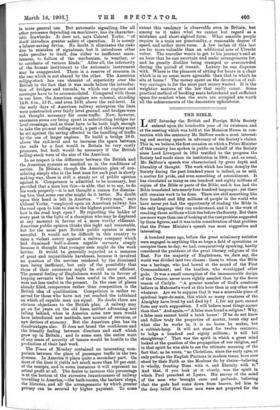AMERICAN AND BRITISH RAILROADS.
WE are so accustomed to bewail our national short- comings on every platform and at every street corner that Colonel Yorke's Report on American Railways will come as a surprise to many of us. Here is actually,a great, department of human industry in which a skilled observer is of opinion that we have not much to learn from the United States. That is a very, satisfactory piece of neWs. It suggests the need for some revision of our estimate of -ourselves. It is not apparently to be assumed —as we are commonly so willing to do—that wherever Britain is different from other nations she is necessarily in the wrong. Different circumstances require differeat treatment ; possibly if foreigners had to meet the same circumstances they would meet them in the same way. Or if the foreign methods are superior to ours as regards a particular purpose, that purpose may only be attained at a sacrifice of something on which Englishmen place _a higher value. A familiar instance of this is the different methods of dealing with luggage in use on British and Continental, railways. Probably the foreigner who finds that on a British line he has to look after his own luggage, and to distinguish his bag or his portmanteau from a score of others closely resembling it, thinks with a fond regret of the numbered. packages and of the luggage ticket which if he were travelling abroad he would have safe in his pocket until such time as he entrusted it to the hotel porter. Englishmen even, if they are travelling with much luggage, appreciate the greater security which the foreign system gives against loss or robbery. They forget the expenditure of time that the foreign plan involves, and the loss of patience which would follow upon the discovery that a quarter of an hour at each end would have to be added to the duration of every journey. On the British method the passenger can come up to the station three minutes before the train starts with a tolerable certainty that his luggage will be got into the van somehow, and get away from the station on arrival the Moment that he can lay hold of a porter. . There is much to be said for both systems, but the recommendations of each do not adroit ef comparison. Who is to decide whether the occasional loss of a box is a greater or less evil than the almost constant loss of time ?
Colonel Yorke does not think that there is much to choose between the modes of construction in use on British and American lines of railway. The particulars in w,hich they differ balance one another, the chief difference being that in America the-use of hardwood for sleepers makes- certain other elements of stability less necessary. But oak or chestnut wood costs much more than the Baltic timber used in Britain, so that there would probably be no economy in adopting the Anierican practice over-here. In the matter of signalling, America seems' to have the advantasze. for automatic signall= in more general use. But automatic signalling, like all other processes depending on machinery, has its character- istic drawba.cks. It does not, says Colonel Yorke, "of itself introduce greater safety of operation. It is merely a labour-saving device. No doubt it eliminates the risks due to mistakes of signalmen, but it introduces other risks • peculiar to itself, due either to inefficient main- tenance, to failure of the mechanism, to weather, or to accidents of various kinds." After all, the inferiority of the human instrument to the automatic instrument may be exaggerated. There is a reserve of resource in the one which is not shared by the other. The American rollitig-stock has one element of superiority over the British in the fact that it was made before the introduc- tion of bridges and tunnels, to which our engines and carriages have to be accommodated. Compared with those in use here, the American engines are colossal, standing 14 ft. 6 in., 15 ft., and even 16 ft. above the rail-level. In the early days of American railway enterprise the lines were constructed over fairly level ground, and bridges were not thought necessary for cross-traffic. Now, however, enormous sums are being spent in substituting bridges for level-crossings, and as these have to be built high enough to take the present rolling-stock, a part of this outlay must be set against the saving effected in the handling of traffic by the use of larger engines. To build a bridge 18 ft. above the rail-level and to increase the space between the rails by a foot would in Britain be very costly processes, but both would be necessary if the British rolling-stock were of the size of the American.
In no respect is the difference between the British and the American systems so marked as in the conditions of service. In Britain, though the American plan of con- sidering simply who is the best man for each post is slowly making way, there is still a steady set of public opinion against it. Competence is admitted to be necessary, but provided that a man has this—is able, that is to say, to do his work properly—it is not thought a reason for dismiss- ing him that some one else might do it better. No doubt upon this head is felt in America. "Every man," says Colonel Yorke, "employed upon an American railway has the road open to him to rise to the highest positions." But how is the road kept open ? By regarding the holder of every post in the light of a champion who may be displaced at any moment in favour of a more worthy eldimant. American public opinion thinks this right and reasonable, but for the most part British public opinion is more merciful. It would not be difficult in this country to raise a violent outcry against a railway company which had dismissed half-a-dozen capable servants simply because it thought that younger men might do the work batter. It would be generally regarded as a measure of great and unjustifiable harshness, because it involved no question of the services rendered by the dismissed men • being inefficient, but only of the possibility that those of their successors might be still more efficient. The general feeling of Englishmen would be in favour of keeping servants who had been useful in the past, and were not less useful in the present. In the case of places already filled, competence rather than competition is the British idea of qualification. Competition is rather re- served for those who have not vet reached the tableland on which all capable men are equal. No doubt there are obvious objections to the British plan. A railway may go on for years on the old lines, neither advancing nor falling behind, when in America some new man .would have introduced new methods, new sources of revenue, or new devices of economy. But the American plan has its disadvantages also. It does not breed the confidence and the friendly feeling between directors and staff which grow up in Britain ; and to some men the entire want of any sense of security of tenure would be hostile to the production of their best work.
The Times of Monday contained an interesting com- parison between the place of passenger traffic in the two systems. In America it plays quite a secondary part. On most of the lines it yields not much more than 10 per cent. of the receipts, and in some instances it will represent no actual profit at all. The desire to increase this percentage is at the bottom of the excessive luxuriousness of railway travelling in America,—the bath-rooms, the barbers' shops, the libraries, and all the arrangements by which greater privacy can be secured by- higher payment. To some
extent this tendency is observable even in Britain, but among us it takes what we cannot but regard as a mistaken and short-sighted form. What sensible people require in a train are punctuality, a reasonable degree of speed, and rather more room. A few inches of this last are far more valuable than an additional acre of Utrecht velvet. The traveller wants to get to his journey's end at an hour that he can ascertain and make arrangements for, and he greatly dislikes being cramped or overcrowded during the period of transit. Luxury he can dispense with. Where is the pleasure of sitting for hours in a chair which is in no sense more agreeable than that in which he sits at home ? The money spent on the decoration of rail- way carriages is for the most part money wasted. It is the weightier matters of the law that really count. Some practical method of booking seats beforehand and sufficient space for comfort when the seats are occupied are worth all the achievements of the decorative upholsterer.











































 Previous page
Previous page